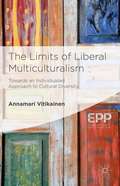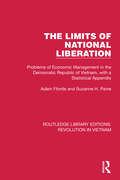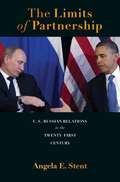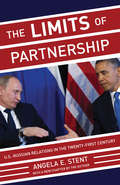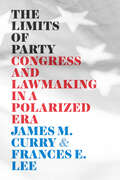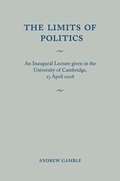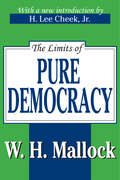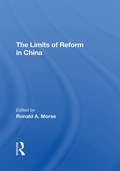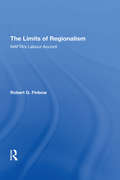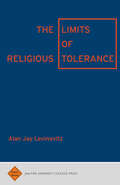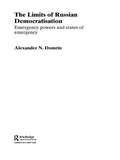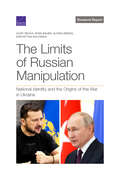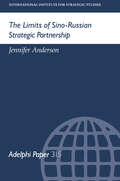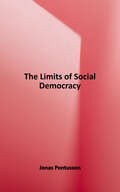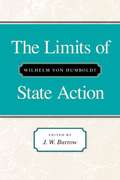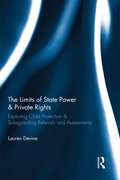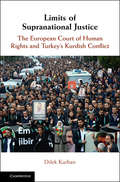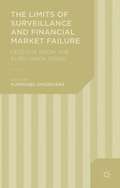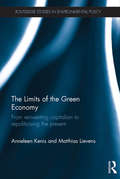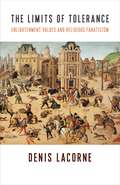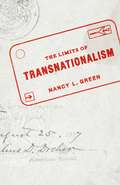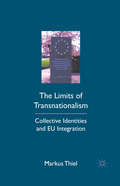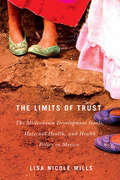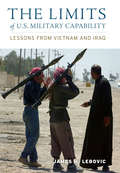- Table View
- List View
The Limits of Liberal Multiculturalism: Towards an Individuated Approach to Cultural Diversity (Palgrave Studies in Ethics and Public Policy)
by Annamari VitikainenThe Limits of Liberal Multiculturalism provides a timely analysis of some of the weaknesses, as well as the successes, of the liberal multicultural project. It also takes a step forward by developing a pluralist, individual-centred approach to allocating minority rights in practice.
The Limits of National Liberation: Problems of Economic Management in the Democratic Republic of Vietnam, with a Statistical Appendix (Routledge Library Editions: Revolution in Vietnam #3)
by Adam Fforde Suzanne H. PaineThis book, first published in 1987, examines the experience of the North Vietnamese economy during the struggle for national reunification and the Vietnam war. It chronicles the impact of war and Socialist Construction upon an extremely poor area left undeveloped by French colonial exploitation. The analysis focuses on the severe restraints that faced socio-economic development in North Vietnam, and the adverse effects of forced development based upon neo-Stalinist institutional models. Deep problems were encountered in attempting to implement Socialist Construction in the North, and wartime aid from fraternal Socialist countries masked the fundamental economic imbalances created by the development effort. After national reunification in 1975 the structural difficulties of the Northern economy and the shortcomings of its economic management system crushed the expectations of rapid peacetime development and led to the economic crisis of the late 1970s.
The Limits of Partnership
by Angela StentThe Limits of Partnership offers a riveting narrative on U.S.-Russian relations since the Soviet collapse and on the challenges ahead. It reflects the unique perspective of an insider who is also recognized as a leading expert on this troubled relationship. American presidents have repeatedly attempted to forge a strong and productive partnership only to be held hostage to the deep mistrust born of the Cold War. For the United States, Russia remains a priority because of its nuclear weapons arsenal, its strategic location bordering Europe and Asia, and its ability to support--or thwart--American interests. Why has it been so difficult to move the relationship forward? What are the prospects for doing so in the future? Is the effort doomed to fail again and again? Angela Stent served as an adviser on Russia under Bill Clinton and George W. Bush, and maintains close ties with key policymakers in both countries. Here, she argues that the same contentious issues--terrorism, missile defense, Iran, nuclear proliferation, Afghanistan, the former Soviet space, the greater Middle East--have been in every president's inbox, Democrat and Republican alike, since the collapse of the USSR. Stent vividly describes how Clinton and Bush sought inroads with Russia and staked much on their personal ties to Boris Yeltsin and Vladimir Putin--only to leave office with relations at a low point--and how Barack Obama managed to restore ties only to see them undermined by a Putin regime resentful of American dominance and determined to restore Russia's great power status. The Limits of Partnership calls for a fundamental reassessment of the principles and practices that drive U.S.-Russian relations, and offers a path forward to meet the urgent challenges facing both countries.
The Limits of Partnership
by Angela E. StentThe Limits of Partnership is a riveting narrative about U.S.-Russian relations from the Soviet collapse through the Ukraine crisis and the difficult challenges ahead. It reflects the unique perspective of an insider who is also recognized as a leading expert on this troubled relationship. American presidents have repeatedly attempted to forge a strong and productive partnership only to be held hostage to the deep mistrust born of the Cold War. For the United States, Russia remains a priority because of its nuclear weapons arsenal, its strategic location bordering Europe and Asia, and its ability to support--or thwart--American interests. Why has it been so difficult to move the relationship forward? What are the prospects for doing so in the future? Is the effort doomed to fail again and again? What are the risks of a new Cold War? Angela Stent served as an adviser on Russia under Bill Clinton and George W. Bush, and maintains dialogues with key policymakers in both countries. Here, she argues that the same contentious issues--terrorism, missile defense, Iran, nuclear proliferation, Afghanistan, the former Soviet space, the greater Middle East--have been in every president's inbox, Democrat and Republican alike, since the collapse of the USSR. Stent vividly describes how Clinton and Bush sought inroads with Russia and staked much on their personal ties to Boris Yeltsin and Vladimir Putin--only to leave office with relations at a low point--and how Barack Obama managed to restore ties only to see them undermined by a Putin regime resentful of American dominance and determined to restore Russia's great power status. The Limits of Partnership calls for a fundamental reassessment of the principles and practices that drive U.S.-Russian relations, and offers a path forward to meet the urgent challenges facing both countries. This edition includes a new chapter in which Stent provides her insights about dramatic recent developments in U.S.-Russian relations, particularly the annexation of Crimea, war in Ukraine, and the end of the Obama Reset.
The Limits of Party: Congress and Lawmaking in a Polarized Era (Chicago Studies in American Politics)
by Frances E. Lee James M. CurryTo many observers, Congress has become a deeply partisan institution where ideologically-distinct political parties do little more than engage in legislative trench warfare. A zero-sum, winner-take-all approach to congressional politics has replaced the bipartisan comity of past eras. If the parties cannot get everything they want in national policymaking, then they prefer gridlock and stalemate to compromise. Or, at least, that is the conventional wisdom. In The Limits of Party, James M. Curry and Frances E. Lee challenge this conventional wisdom. By constructing legislative histories of congressional majority parties’ attempts to enact their policy agendas in every congress since the 1980s and by drawing on interviews with Washington insiders, the authors analyze the successes and failures of congressional parties to enact their legislative agendas. Their conclusions will surprise many congressional observers: Even in our time of intense party polarization, bipartisanship remains the key to legislative success on Capitol Hill. Congressional majority parties today are neither more nor less successful at enacting their partisan agendas. They are not more likely to ram though partisan laws or become mired in stalemate. Rather, the parties continue to build bipartisan coalitions for their legislative priorities and typically compromise on their original visions for legislation in order to achieve legislative success.
The Limits of Politics: An Inaugural Lecture Given in the University of Cambridge, 23 April 2008
by Andrew GambleThis lecture explores the limits of politics in three senses: as a subject of study at Cambridge, as an academic discipline, and as a practical activity. Politics did not develop as an independent academic subject in Cambridge in the twentieth century, and only now is this situation being rectified with the creation of the new Department of Politics and International Studies. Politics as an academic discipline was once conceived as the master science. More recently it has become much more limited in its scope and its methods, but it still needs to preserve a tradition of political reasoning which focuses on problems rather than methodology, and is concerned with understanding the limits to politics. The limits of politics as a practical activity are explored through four modes of political reasoning: the sceptical, the idealist, the rationalist and the realist, as exemplified by the writings of Oakeshott, Keynes, Hayek, and Carr.
The Limits of Pure Democracy
by William Hurrell MallockThe 1910s was a decade in which theories of socialism, pacifism, and collectivism flowered. Publicists and playwrights from Sidney Webb to George Bernard Shaw expressed not just belief in "utopianism" but a vigorous assault on the existing political and economic order. Less well known is how a group of Tory thinkers laid the foundations of a conservative counter-attack expressed with equal literary and intellectual brilliance. Foremost among them was W. H. Mallock. In The Limits of Pure Democracy he argued that the pseudo-populist leaders of the political party system promise everything but deliver only the end of parties as such. For Mallock, what starts with populism ends in dictatorship. The Russian Revolution was simply the historical outcome of utopian socialist visions that were more dedicated to destroying the present system of things than bringing about a revitalized future. Mallock's book explains how the modern free market succeeds through competition in increasing output, broadening occupational opportunities, and multiplying the numbers of skilled professionals. In contrast, welfare schemes serve to deepen poverty by spreading wealth so evenly that incentives to work decline and personal savings are eliminated. These arguments have become commonplace today. But at the time they served as an incendiary reminder that class warfare works in both directions. Mallock was a remarkably talented writer who made the case against exaggerated expectations, a nascent welfare system, and mass political parties led by oligarchs. But he also offered a case for increasing a regard for work, advancing the cause of education as a method of entering the modern world, and for retaining a sense of religious codes that define the West. Mallock's search for an understanding of popular rule coincided with his appreciation and elucidation of the limitations of the emerging plebiscitarian spirit within democracy. The Limits of Pure Democracy will
The Limits Of Reform In China
by Ronald A. Morse Shaun MurphyFive years after Beijing's pragmatic new leadership embarked on its Four Modernizations program, the obstacles to change in China are becoming apparent, agree the contributors to this book. Focusing on developments since Mao's death and pointing to the negative effects of China's massive bureaucracy, the regime's reluctance to give up Soviet-style
The Limits of Regionalism: NAFTA's Labour Accord (The\international Political Economy Of New Regionalisms Ser.)
by Robert G. FinbowAssessing the effectiveness of the North American Agreement on Labour Cooperation (NAALC), this book examines the operation of the core institutions (the Secretariat and National Administrative Offices) over the past seven years. It discusses the main functions of these institutions in hearing public submissions on violations of labour laws and in conducting research and cooperative activities. Based on interview research, the analysis reviews the strengths and weaknesses of the accord to assess its contribution to a common labour relations regime in North America and its impact in creating new transnational communities of actors in government and civil society in the three countries. The NAALC is also compared with the social dimension of the European Union system, and a final assessment is made as to whether the NAALC institutions live up to the promises of their founders and whether these can be a model for labour relations in any future Free Trade Area of the Americas (FTAA) agreement.
The Limits of Religious Tolerance
by Alan Jay LevinovitzReligion’s place in American public life has never been fixed. As new communities have arrived, as old traditions have fractured and reformed, as cultural norms have been shaped by shifting economic structures and the advance of science, and as new faith traditions have expanded the range of religious confessions within America’s religious landscape, the claims posited by religious faiths—and the respect such claims may demand—have been subjects of near-constant change. In The Limits of Religious Tolerance, Alan Jay Levinovitz pushes against the widely held (and often unexamined) notion that unbounded tolerance must and should be accorded to claims forwarded on the basis of religious belief in a society increasingly characterized by religious pluralism. Pressing at the distinction between tolerance and respect, Levinovitz seeks to offer a set of guideposts by which a democratic society could identify and observe a set of limits beyond which religiously grounded claims may legitimately be denied the expectation of unqualified non-interference.
The Limits of Russian Democratisation: Emergency Powers and States of Emergency (BASEES/Routledge Series on Russian and East European Studies)
by Alexander DomrinWritten by an established scholar in the field, this text examines the nature of emergency powers and their use in the Russian constitution. It explores the use of such powers in Russian history, comparing the Russian situation with those that exist in other countries and discussing the legal thought underpinning such powers. The practicalities and theories of emergency orders are traced throughout history with Dormin arguing that the longer an emergency regime lasts, the less effective the measure becomes. With original research and remarkable insight, this text will be of interest to scholars examining the new Russia, its rulers, conflicts and motives, as well as its political systems.
The Limits of Russian Manipulation: National Identity and the Origins of the War in Ukraine
by Clint Reach Alyssa Demus Khrystyna HolynskaRussia’s manipulation of Ukraine, which culminated in the 2022 invasion, demonstrated that Russia was willing to resort to all means necessary to secure a regional sphere of influence that included Ukraine. But events could have taken a different direction. Using the concept of national identity as a starting point, RAND researchers developed a framework to illuminate the underlying causes of the Russia-Ukraine war.
The Limits of Sino-Russian Strategic Partnership (Adelphi series)
by Jennifer AndersonRussia and China claim to have established a "strategic partnership". Jennifer Anderson argues that this relationship merely overlays a diplomatic agenda established in the late 1980s, and that China's pragmatic, limited approach (coupled with Russia's domestic economic and political difficulties) have meant that the Sino-Russian strategic partnership is unwieldy and imprecise.
The Limits of Social Democracy: Investment Politics in Sweden (Cornell Studies in Political Economy)
by Jonas PontussonPontusson's book does an excellent job of taking a critical look at Swedish investment politics. . . . On the whole, this book is the best overall explanation of Swedish investment politics. It gives the reader a clear basis for understanding the rise of Swedish social democracy and provides a detailed examination of the developments of industrial policy, codetermination, and wage-earner funds.'--Contemporary Sociology.
The Limits of State Action
by Wilhelm Von HumboldtThe grand, leading principle, towards which every argument . . . unfolded in these pages directly converges, is the absolute and essential importance of human development in its richest diversity. This description by Wilhelm von Humboldt of his purpose in writing The Limits of State Action animates John Stuart Mill's On Liberty and serves as its famous epigraph. Seldom has a book spoken so dramatically to another writer. Many commentators even believe that Humboldt's discussion of issues of freedom and individual responsibility possesses greater clarity and directness than Mill's. The Limits of State Action, by "Germany's greatest philosopher of freedom," as F. A. Hayek called him, has an exuberance and attention to principle that make it a valuable introduction to classical liberal political thought. It is also crucial for an understanding of liberalism as it developed in Europe at the turn of the nineteenth century. Humboldt explores the role that liberty plays in individual development, discusses criteria for permitting the state to limit individual actions, and suggests ways of confining the state to its proper bounds. In so doing, he uniquely combines the ancient concern for human excellence and the modern concern for what has come to be known as negative liberty. J. W. Burrow is Professor of History at the University of Sussex.
The Limits of State Action
by Wilhelm Von Humboldt J. W. BurrowThe Limits of State Action has an exuberance and attention to principle that make it a valuable introduction to classical liberal political thought It is also crucial for an understanding of liberalism as it developed in Europe at the turn of nineteenth century. Humboldt explores the role that liberty plays in individual development, discusses criteria for permitting the state to limit individual action's and suggests ways of confining the state to its proper bounds.
The Limits of State Power & Private Rights: Exploring Child Protection & Safeguarding Referrals and Assessments
by Lauren DevineThis book tackles a complex area of law, social policy and social work, providing a comprehensive analysis of the theoretical, practical and legal boundaries of State power following safeguarding and child protection referrals in England. The book examines the history, rationale and implications of the current position, concluding that the balance of power is weighted in favour of the State. The Limits of State Power & Private Rights is ground-breaking in its approach to the subject and its detailed, critical analysis. Traditionally the subject matter of the book is considered within a welfare framework. The analysis in this book argues that a policing agenda is embedded within policy but without appropriate safeguards and controls, creating potentially irreconcilable tension described by the author as the ‘welfare/policing dichotomy’. This book is of importance to academics, lawyers, social workers, policy makers, practitioners and service users. The book is written so as to be accessible to a multi-disciplinary audience, but is sufficiently detailed so as to be suitable for specialists and non-specialists alike in this subject area. The chapters include introductory and contextual sections as well as doctrinal, theoretical and socio-legal analysis. Although the focus is on the English system, the book is equally applicable to the many worldwide jurisdictions adopting the Anglo/American ‘child rights’ based framework of child protection. It is also of use as a comparative work in countries where a family support based system is practiced.
Limits of Supranational Justice: The European Court of Human Rights and Turkey's Kurdish Conflict
by Dilek KurbanWith its contextualized analysis of the European Court of Human Rights' (ECtHR) engagement in Turkey's Kurdish conflict since the early 1990s, Limits of Supranational Justice makes a much-needed contribution to scholarships on supranational courts and legal mobilization. Based on a socio-legal account of the efforts of Kurdish lawyers in mobilizing the ECtHR on behalf of abducted, executed, tortured and displaced civilians under emergency rule, and a doctrinal legal analysis of the ECtHR's jurisprudence in these cases, this book powerfully demonstrates the Strasbourg court's failure to end gross violations in the Kurdish region. It brings together legal, political, sociological and historical narratives, and highlights the factors enabling the perpetuation of state violence and political repression against the Kurds. The effectiveness of supranational courts can best be assessed in hard cases such as Turkey, and this book demonstrates the need for a reappraisal of current academic and jurisprudential approaches to authoritarian regimes.
The Limits of Surveillance and Financial Market Failure
by Kumiharu ShigeharaThis book examines the effectiveness of surveillance by international institutions for financial crisis prevention. It discusses issues relating to designing effective micro- and macro-prudential policies, their mixes and their coordination with monetary policies for achieving financial stability while promoting better macroeconomic performance.
The Limits of the Green Economy: From re-inventing capitalism to re-politicising the present (Routledge Studies in Environmental Policy)
by Anneleen Kenis Matthias LievensProjecting win-win situations, new economic opportunities, green growth and innovative partnerships, the green economy discourse has quickly gained centre stage in international environmental governance and policymaking. Its underlying message is attractive and optimistic: if the market can become the tool for tackling climate change and other major ecological crises, the fight against these crises can also be the royal road to solving the problems of the market. But how ‘green’ is the green economy? And how social or democratic can it be? This book examines how the emergence of this new discourse has fundamentally modified the terms of the environmental debate. Interpreting the rise of green economy discourse as an attempt to re-invent capitalism, it unravels the different dimensions of the green economy and its limits: from pricing carbon to emissions trading, from sustainable consumption to technological innovation. The book uses the innovative concept of post-politics to provide a critical perspective on the way green economy discourse represents nature and society (and their interaction) and forecloses the imagination of alternative socio-ecological possibilities. As a way of repoliticising the debate, the book advocates the construction of new political faultlines based on the demands for climate justice and democratic commons. This book will be of interest to students and scholars of environmental politics, political ecology, human geography, human ecology, political theory, philosophy and political economy. Includes a foreword written by Erik Swyngedouw (Professor of Geography, Manchester University).
The Limits of Tolerance: Enlightenment Values and Religious Fanaticism (Religion, Culture, and Public Life #4)
by Denis LacorneThe modern notion of tolerance—the welcoming of diversity as a force for the common good—emerged in the Enlightenment in the wake of centuries of religious wars. First elaborated by philosophers such as John Locke and Voltaire, religious tolerance gradually gained ground in Europe and North America. But with the resurgence of fanaticism and terrorism, religious tolerance is increasingly being challenged by frightened publics.In this book, Denis Lacorne traces the emergence of the modern notion of religious tolerance in order to rethink how we should respond to its contemporary tensions. In a wide-ranging argument that spans the Ottoman Empire, the Venetian republic, and recent controversies such as France’s burqa ban and the white-supremacist rally in Charlottesville, The Limits of Tolerance probes crucial questions: Should we impose limits on freedom of expression in the name of human dignity or decency? Should we accept religious symbols in the public square? Can we tolerate the intolerant? While acknowledging that tolerance can never be entirely without limits, Lacorne defends the Enlightenment concept against recent attempts to circumscribe it, arguing that without it a pluralistic society cannot survive. Awarded the Prix Montyon by the Académie Française, The Limits of Tolerance is a powerful reflection on twenty-first-century democracy’s most fundamental challenges.
The Limits of Transnationalism
by Nancy L. GreenTransnationalism means many things to many people, from crossing physical borders to crossing intellectual ones. The Limits of Transnationalism reassesses the overly optimistic narratives often associated with this malleable term, revealing both the metaphorical and very real obstacles for transnational mobility. Nancy L. Green begins her wide-ranging examination with the story of Frank Gueydan, an early twentieth-century American convicted of manufacturing fake wine in France who complained bitterly that he was neither able to get a fair trial there nor to enlist the help of US officials. Gueydan’s predicament opens the door for a series of inquiries into the past twenty-five years of transnational scholarship, raising questions about the weaknesses of global networks and the slippery nature of citizenship ties for those who try to live transnational lives. The Limits of Transnationalism serves as a cogent reminder of this topic’s complexity, calling for greater attention to be paid to the many bumps in the road.
The Limits of Transnationalism
by Markus ThielThrough the application of public opinion, interview, and print-media analyses, this book provides evidence that the state of transnational identification among citizens in the EU as a result of post-Maastricht integration measures, such as the completion of the Common Market, the introduction of the Euro, the initiation of the Common Foreign and Security Policy etc. in the United Kingdom, Ireland, and Germany had limited effects in the member states to the extent that national political cultures and mass media orientations are compatible with the goals of EU integration. Policy recommendations are derived by reviewing the complex relationship between EU policies and structural factors such as immigration, ageing and the mediatization of politics in which European integration occurs.
The Limits of Trust: The Millennium Development Goals, Maternal Health, and Health Policy in Mexico (McGill-Queen's Studies in Gender, Sexuality, and Social Justice in the Global South #3)
by Lisa Nicole MillsWhen the United Nations announced the Millennium Development Goals (MDGs) in 2000, approximately half a million women worldwide died each year from complications associated with pregnancy and childbirth. The fifth MDG aimed to reduce the maternal mortality rate by 75 per cent between 1990 and 2015, but by the target date, the goal had not been reached. In The Limits of Trust Lisa Nicole Mills investigates the reasons why Mexico in particular did not meet its objective. Focusing on the states of Guerrero, Chiapas, and Oaxaca, where maternal mortality rates are the highest in the country, Mills looks into how MDG 5 has been implemented in Mexico, how it has been experienced by individuals and groups, what obstacles have been encountered, and what factors have facilitated improvements in maternal health. Using data gathered from interviews with NGOs, government officials, and health care workers, the book argues that government and feminist NGO efforts to build trust in the health care system have fallen short because of systemic failures to protect women’s rights and enhance the quality of health care. In Mexico a woman’s risk of dying from a pregnancy‐related complication is five times higher than in developed countries. The Limits of Trust explores the realities of implementing maternal health initiatives on the ground in rural, remote, and impoverished areas, and the steps that can be taken to successfully combat maternal mortality.
The Limits of U.S. Military Capability: Lessons from Vietnam and Iraq
by James H. LebovicPolitical scientist James H. Lebovic establishes that the size, strength, flexibility, and adaptability of the U.S. military cannot ensure victory in asymmetrical conflicts.In The Limits of U.S. Military Capability, Lebovic shows how political and psychological factors trumped U.S. military superiority in Vietnam and Iraq, where inappropriate strategies, low stakes, and unrealistic goals mired the United States military in protracted, no-win conflicts. Lebovic contends that the United States is at a particular disadvantage when fighting a counterinsurgency without the full support of the host government; when leveraging various third parties (the adversary's foreign allies, societal leaders, and indigenous populations); when attempting to build coalitions and nations while involved in combat; and when sustaining government and public support at home when costs rise and benefits decline.Lebovic cautions against involving the U.S. military in operations without first considering U.S. stakes and suggests that the military take a less-is-more approach when choosing to employ force. Ambitious goals bring higher costs, unexpected results, diminished options, and a greater risk of failure. Rejecting the heavy-handed approach that is typical of most comparisons between the Vietnam and Iraq wars, The Limits of U.S. Military Capability carefully assesses evidence to develop lessons applicable to other conflicts—especially the ongoing war in Afghanistan.
